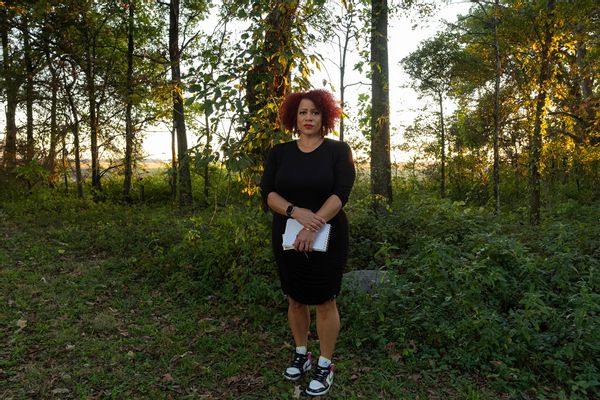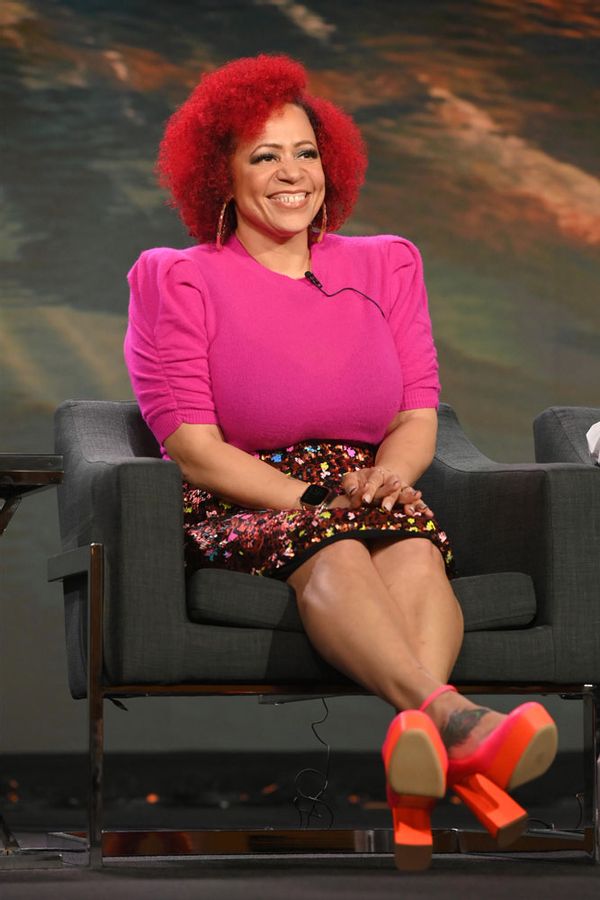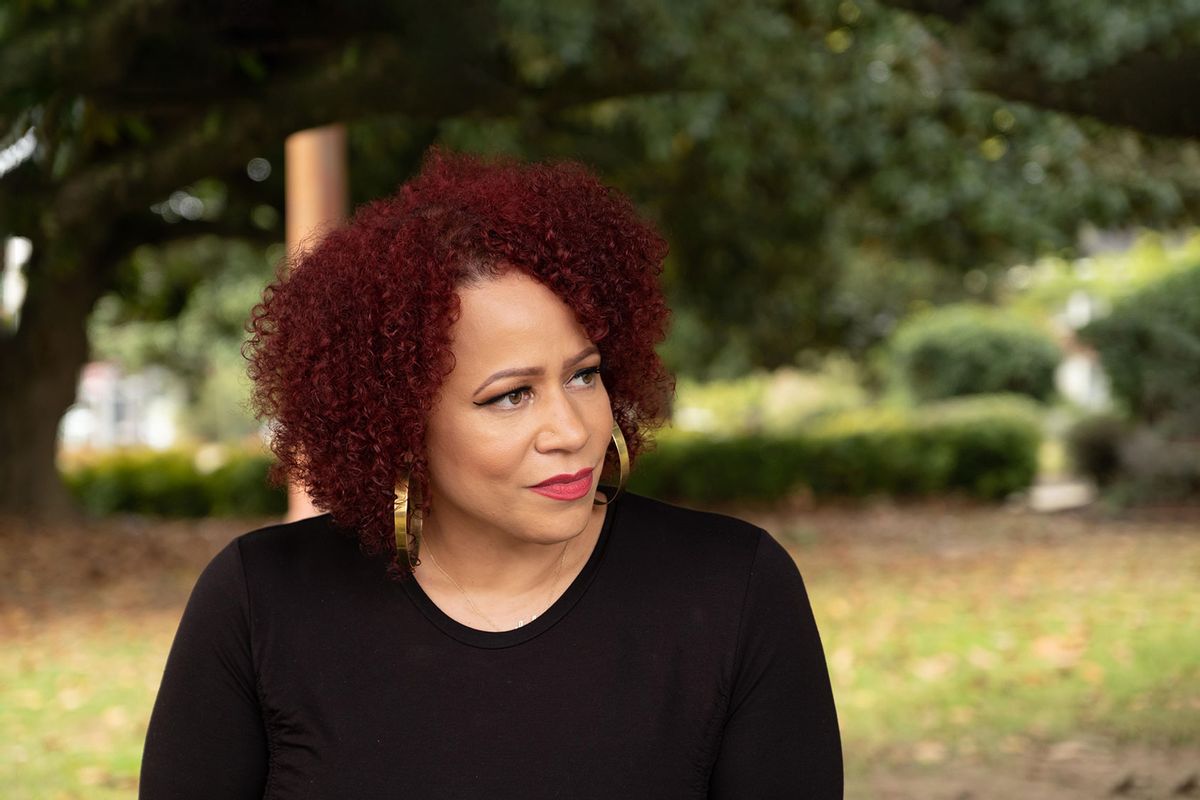The New York Times Magazine issue that published the first edition of "The 1619 Project" came out on a Wednesday – August 14, 2019. The night before was unforgettable for its creator Nikole Hannah-Jones, who admitted to Salon, "I was a complete mess. I was anxious. I couldn't sleep because I had no idea."
She's referring to the question of whether she had an inkling as to how people would react to it – not the gargantuan cultural impact its essays, fiction, poetry and photographs would eventually have. "The 1619 Project" earned Hannah-Jones a Pulitzer Prize for her essay on democracy, the work's foundational text. In 2021 she became Howard University's inaugural Knight Chair in Race and Journalism.
The project's goal was to invite a reconsideration of the United States' legacy of slavery on the 400th anniversary of the first time enslaved Africans set foot on Virginian soil. That it did, powerfully enough to set in motion a right-wing backlash that's still reverberating through state legislatures and school districts.
The Critical Race Theory canard is sold to justify the excision of Black history from school curriculums and criminalizing its teaching in the most basic sense, as Florida Gov. Ron DeSantis and Texas Gov. Greg Abbott are busily doing. There have been shoddily produced attempts at rejoinders to "The 1619 Project" in the form of the Trump Administration's "1776 Project" and a committee dedicated to creating a "patriotic" telling of Texas history dubbed the 1836 Project.
"The backlash is a sign of the success of the project,"
said Hannah-Jones.
Book bans have also become a feature of these spasmodic reactions, but legislators haven't found a way to stop history lessons from being broadcast or streamed to people's televisions. Few TV adaptations of historic or cultural texts can match the depth of the written work, but in distilling "The 1619 Project" into six installments partly presented from the perspective of Hannah-Jones' personal history, it becomes more easily consumable and attainable to a much broader swath of people.
"Part of the backlash, I think, is people are just really surprised by what we argue in the project and there are certain Americans who think, if this were true, certainly I would have heard about it before," Hannah-Jones recently told reporters at a Hulu-hosted press conference for the Television Critics Association. "And then, of course, there's the backlash that is strictly political, which is this project exposes power, exposes hierarchy, exposes that we were founded on lofty ideals of democracy and freedom and also the practice of slavery and what does that mean for the country that we live in today.
"To me, the backlash is a sign of the success of the project," she added. "If there weren't lots of Americans who were ready and willing to have a different understanding of our country, you wouldn't see such intensity against the project."
Before that event Hannah-Jones sat down with Salon to discuss what it means to see "The 1619 Project" evolve from a magazine issue, a podcast and a book into a documentary series that blends history with what she describes as artistic "breaths."
This interview has been edited for length and clarity.
When you were conceiving "The1619 Project," did you have any idea of how it would be received after its publication?
No, I didn't. As a journalist, you can work really hard on something, you can think it's really important and powerful, but you have no control over how it goes into the world and how people respond to it. And there's so much grabbing your attention at any one time. And this was thousands of words on slavery and its legacy. So no, I had no expectation whatsoever, and in fact, a lot of trepidation. But of course I have been continuously awed by how people have responded to the work.
Related to that, did you think that it would ever become a TV series or streaming series?
No. I'm an old school print journalist, I've spent my entire career in print and didn't even conceive of it as something that would be turned into television. So that's been an amazing bonus, because of course I understand the power of the medium. But it's not a medium I've ever worked in.
With regard to the Hulu version of "1619," what do you perceive are the strengths of seeing a visual version of this work?
I think that what having this as a docuseries does is, in some ways, democratizes access. I come from, as you can see in the documentary, a very working class community in a small town or a small city in Iowa. And I think a lot about, as we were deciding to turn this into television, this is something my family will watch. People want this information but frankly, like most Americans, no matter what your education or occupation, are not reading a 500-page book, right? Or they're not reading 10,0000-word magazine essays. But that doesn't mean they don't want the information.
So to me, that is the beauty. You're able to connect with people on a different level. You appeal to different senses, and I think, different parts of the brain when you have television. But also, you're able to get people this type of information who may not have access to it in the same way. So that, to me, is really the strength of this type of storytelling. And it's been really interesting, because, you know, now it's been a magazine, a book, a podcast, and you see all of the different ways you can bring storytelling to bear on a single project.
 Nikole Hannah-Jones in "The 1619 Project." (Patti Perret/Hulu)
Nikole Hannah-Jones in "The 1619 Project." (Patti Perret/Hulu)
I also think that in this day and age – and this is going to sound naïve but I stand by this – I do think that when you put the visual in front of somebody that makes the fact a little less deniable, unless somebody is really married to the lie, by dint of the perspectives that are brought by historians, experts, people who lived this history. And I know that you've gone through it, with everything that came out and in terms of the backlash to the project. So, I'm curious to know, were you thinking about that when you were selecting what to put into these episodes? Were there elements or people that you included in order to make the details undeniable?
What we spent a lot of time on is one, how do you humanize this history? How do you find representatives that are trying to carry the weight of this history, the people who are living today? And that really is the beauty of the series. Yes, I can teach you about this history, and I can argue that this history is impacting real human beings. But are you seeing those real human beings? Are you seeing the story of the way that something that happened 100 years ago or 200 years ago is still playing out in the lives of regular people whom you can relate to? You can see your own struggles or your own stories in their stories. . . . Once we selected which essays we wanted to build the episodes around, the first things we were thinking about were, who are the people, the real regular people that we will tell these stories through?
When I first read "The 1619 Project" in the New York Times, all of these concepts marry together in each of the essays, but these specific episode titles – "Democracy," "Race," "Music," "Capitalism," "Fear" and "Justice" – can you talk about why you chose to break down the series that way?
Sure, we really wanted to get those that distill the American identity with the most strength, that if you wanted to understand how slavery has shaped our entire country, what are the subject areas that most help explain that? But also, we think we know so much about and in fact, we don't.
So, of course, Democracy and Capitalism are the two pillars that have this notion of American exceptionalism, that we are the oldest greatest democracy in the history of the world, and that capitalism is the freest economic system in the history of the world, and that we were built upon these two ideas. So we wanted to really challenge those core ideas of American identity.
Race was important, because race is something that we believe we understand . . . but we really don't. How can you understand the legacy of slavery if you don't actually understand how race was constructed? So that was really critical.
"Yes... I can argue that this history is impacting real human beings. But are you seeing those real human beings?" asked Hannah-Jones.
Music: One, we didn't want this project to just be about what has happened to Black people, or the suffering of Black people, but really, to show through the series, that out of these unique circumstances, Black Americans have created amazing culture. And that to really reinforce this idea that there is no America without Black Americans, that the America that we all live in has been shaped indelibly by the contributions of Black Americans.
And then of course, the Fear essay is in some way, staring into the moment, these divisions that we see in our country every single day, and trying to show that we are responding to Black people in certain contexts, because we are primed to respond to them, based on our history.
And, of course, the last essay being Justice, which is the same argument that we make in the book: if you watch this entire series, if you buy the argument that we're making, then you know that a great debt is owed to Black Americans. And it was really important to me in this series, that we get an hour that is geared towards making the argument for reparations. That it's not enough to just talk about the past and the harm that was done, but to empower people to know we actually have a tool to address it and that justice requires repair. So that was really our thinking in selecting these six episodes. But some of them were easier than others.
Want a daily wrap-up of all the news and commentary Salon has to offer? Subscribe to our morning newsletter, Crash Course.
There's a lyrical artistic presentation throughout these episodes. It isn't simply the standard documentary series in that way. There are these moments with, for instance, dancers by the ocean. Or when we see subjects shot through elaborate picture frames. What was the importance of including those touches?
Thank you for that question. So that was inspired really by two things. One, our book, the "1619" book and the project was also not kind of typical journalism or typical anthology, and we really wanted to bring in those creative elements. Because how do you tell a 400-year story of a people? It never felt like it could just be essays. So we wanted to visually bring that same element of the beauty and the creativity and kind of a mental break from all of the heaviness of the material into the project. We wanted to kind of replicate that in documentary form.
And we also didn't want this just to feel like a standard documentary series. We wanted to be contemporary. It's not just again, about something that happened a long time ago, it is about our country right now. And so bringing those elements in, we hope, sends a message that we're not a typical documentary, gives you a different, more modern feel, and brings these beautiful . . . breaths, I think that's, that's what I will call it. These provide breaths in the series.
 Nikole Hannah-Jones attends the TCA Press Event for Hulu's "The 1619 Project" at the Langham Huntington in Pasadena, California on January 14, 2023. (Photo by Stewart Cook/Hulu)
Nikole Hannah-Jones attends the TCA Press Event for Hulu's "The 1619 Project" at the Langham Huntington in Pasadena, California on January 14, 2023. (Photo by Stewart Cook/Hulu)
I never like to tell people to only watch one episode of like this or any show, but I also think it's inevitable that people with ask something like that. And I'm curious to know from you which episode you would recommend if someone simply wanted to have an entry point that's not necessarily in the order its presented? Which one would you tell them to watch?
OK, what would you say?
I'm going to offer this with a caveat, because I know exactly who I would say this to. But I would say the "Fear" episode, because I think it explains a lot about things people don't understand. That also goes against what I believe in terms of what you're saying, in terms of showing the joy, because that's important. But I think in terms of what people are disbelieving, and the right's reframing of the Black Lives Matter movement, and the uprisings and their importance, that episode gives those a lot of context. And going back to what I was saying, Derrick Ingram's story is undeniable. That's why I was asking which one you'd think of.
Yes. Thank you for sharing that.
It's hard for me, of course, as you knew it would be, to pick an episode. But I guess if I had to pick one, it would probably actually be "Race." Because, again, we all think we get how race works, and how, why we divide people in different races, but we don't. But also, I think what's so powerful about that essay, is we talk about slavery through Black women. And that is a rare thing.
We tend to think about slavery as being the physical labor, but not the sexual labor, the sexual exploitation that Black women had to undergo for slavery to continue. The fact that slavery was literally being reproduced in the wombs of Black women. And that we still think that Black women are hurting our children through our wombs. So I think that's just an important way for us to think about slavery.
I tell my students at Howard all the time, we have to stop thinking about slavery as a racist institution. Slavery is an economic institution, and race is a political construct. It is a sociopolitical construct. It's not real, it was created with a purpose of determining who could be enslaveable and who couldn't. And if you understand that, and that the rules are nonsensical – I can be Black and someone who has no white in them whatsoever can be Black, and it's all just made up, really to perpetuate the legacy of slavery – I think that can be a transformative understanding to have all of these other more challenging conversations.
But it's hard. And if you asked me that question, tomorrow, I'll say something different.
I will say this: if you only watch one episode, though, then I want people to watch the "Justice" episode. Because the most powerful thing I think that this documentary series can do is finally help us continue to move forward on, what do we do about this legacy of slavery? Black Americans are at the bottom of every indicator of wellbeing, and it's not because there's something wrong with Black people. And so if we can help move that conversation about what justice looks like forward, that will be the reason that this project exists.
The first two episodes of "The 1619 Project" premiere Thursday, Jan. 26 on Hulu.
Read more
about this topic



Shares